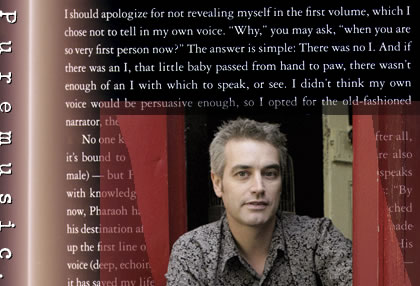
A Conversation with Wesley Stace (continued)
PM: Just a couple more things about the book. In this sort of beautifully ironic way that is really your forte, in your songs, as well as in this book, you seem to be kind of playing out the classic love story, all within a single human heart. Rose's story, yes, it's about him and the love he eventually finds, but it's also about the love that happens between his two sides, so that it's like girl meets boy, they lose each other, they reunite, all within his own psyche.
WS: I think that's absolutely right. And it's a very nice way of looking at it, as well.
PM: And the theme of transformation is, I think, so critical to this book. And you, yourself have gone through--it seems, from the outside--quite a lot of transformation in your life. I mean, from Ph.D. candidate in social and political science, at Cambridge, to folksinger/songwriter, to rock musician, now novelist. I was just curious, did writing this book and sort of going through Rose's story, his transformation, transform you, as a musician, as a songwriter, or just as a person?
WS: Yes, it has, and it does. This year I am now--since I wrote the book--I am now married, and my wife is expecting a baby.
PM: Ah! Congratulations!
WS: So that's some kind of a transformation.
PM: Yeah, I'll say.
WS: But in practical terms, writing Misfortune has taught me what I always knew, that it really is worth doing the things that you want to do, however foolhardy they seem, and that they will probably be the best things you do. And making the book has filled me with great confidence about making music--not that I was lacking it, but it's made me feel that I can approach music in terms of projects I really enjoy doing rather than feeling on a treadmill of a career. That has really liberated me. I might well have not made the Love Hall Tryst record, but it was a deeply satisfying record for me to make. I'm very proud of having done it. And I might not have done that if I'd been really looking at what was the next thing for me to do.
PM: Career-wise...
WS: Yes. It freed me a little. I have two solid projects in mind for my next album, and it's just a flip of the coin--I mean, it's whichever one I want to do. They're completely different. Neither are quite straight down the garden path. And I think they're both good, and I haven't even written the songs. I mean, I have lots of songs, but for these two projects, I'd need a whole different lot of songs.
PM: So they're sort of in the concept phase, basically.
WS: And you know a guy called Chris Bachelder has just written a novel called Upton Sinclair. It's called, actually, U.S. It's coming out next year. And I'm writing these songs for a folksinger in that book, because it's a project that I think is really interesting.
PM: Sounds it.
WS: So, it was just very liberating to write the book. The reason a lot of things are in this book is that I decided that if I was going to write a book set in the 1830s, I would put everything I was comfortable writing about in there, things I like, things that I didn't have to go to the library about. And those include ballads and folk music, Ovid, libraries, English country houses--because I like them. Basically, I wrote a book about things I knew about already.
PM: So to some degree, readers of your book, if we read between the lines, are getting a snapshot of Wesley Stace.
WS: Yes, definitely. I don't see how a novelist could really not do that. I don't see how you could spend all that time on something and not give yourself away. I don't even look at it as giving myself away anyway, but you know what I mean.
PM: I do. continue